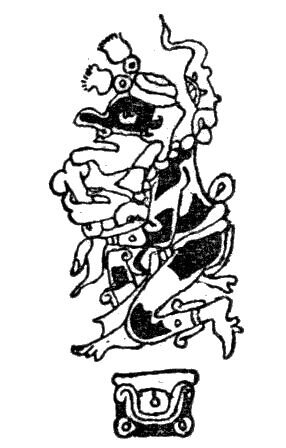The White, Milk, And Dark Ages

The health benefits of chocolate pale before its benefits as a storytelling tool.
The health benefits of chocolate pale before its benefits as a storytelling tool.
Chocolate is something that came quite late to the "civilized" world and was unknown in the medieval and renaissance eras that generally inspire our games, but in South America, it was probably first actively cultivated around 400 CE and evidence of its consumption goes back tens of thousands of years. Long before it was known in Europe, to the Mayans, chocolate was the drink of the gods and was itself holy to some degree. Their religion apparently included a god of chocolate, variously known as Ek Chuaj or Ek Chuah. A god of mercantilism, Ek Chuaj was often portrayed with a red-brown circle around his mouth, or else as a man with only one tooth, both of which seem to me to be possible references to excessive chocolate consumption. For the Mayans, of course, chocolate wasn't quite the same thing as it is for us. Without the addition of fat and sugar, their chocolate was arguably closer to what we'd call coffee, and among the powerful of that civilization it was probably used much the same way. The Aztecs, who probably obtained chocolate from the Maya, believed that it conferred wisdom and knowledge... which arguably is why many of my colleagues in the hospital drink coffee, too.
As shouldn't be surprising, chocolate has also been believed to have a variety of health benefits over the centuries. We know little about what the ancient peoples of South America believed, but many records from the colonial period survive, so we can see what Europeans and, later, Americans believed. Nineteenth-century texts describe using chocolate (or more precisely, cocoa powder) to treat cholera. tuberculosis, asthma, smallpox, yellow fever and other illnesses. Unfortunately, many of these beliefs about chocolate stem from disproven models of pathophysiology, such as the humoural theory, and unsurprisingly our modern investigations generally haven't supported what our ancestors hypothesized. This doesn't mean that we're right and they were wrong, of course, but it means that the evidence is against them.
Although research has been somewhat conflicted, chocolate really does seem to have some health benefits, mostly for the heart and the nervous system. Depending on how it's made, it can be rich in health-promoting antioxidants as well as alertness-promoting caffeine and theobromine (a chemical which, by a circuitous route, derives its name from the Greek for "food of the gods"). Good-quality studies have suggested that chocolate makes a very poor antidepressant (largely because people who eat it while depressed tend to then feel guilty about their calorie consumption) and does not, in fact, have much in the way of aphrodisiac properties beyond that assigned to it by effective marketing. Much of the confusion in the data can be explained by uncertainty over the definition of "chocolate," since the health benefits are primarily seen in dark chocolate but most of the chocolate consumption outside of the laboratory is lighter chocolate and this skews the data when we take people who eat it and look backwards to see how it's affected them.
In a campaign setting, cocoa has a number of potential uses as a plot device or MacGuffin. I've personally always liked the idea of having a group of characters "discover" a foreign land where something like chocolate, unknown in their usual stomping grounds, is readily available, simply because I would like to see how a few particular players in my circle would exploit it. The fact that chocolate would have tremendous cultural and medical value to the foreign civilization provides all the more potential for comedic mischief. Add in the fact that Ek Chuaj, god of chocolate, was a deity of both mercantilism and warfare, and you have the set-up for an epic storyline of combat of the levels of heroes, armies, and economies. Finally, if chocolate is not merely a luxury good, but also believed to be the only cure to some horrid plague afflicting the players' home, and you have the potential to be the backdrop for an entire campaign.
More than four years ago, Dr. Eris Lis, M.D., began writing a series of brilliant and informative posts on RPGs through the eyes of a medical professional, and this is the one that appeared here on February 1, 2015. Lis is a physician, gamer, and author of the Skirmisher Publishing LLC OGL sourcebook Insults & Injuries, which is also available for the Pathfinder RPG system.






